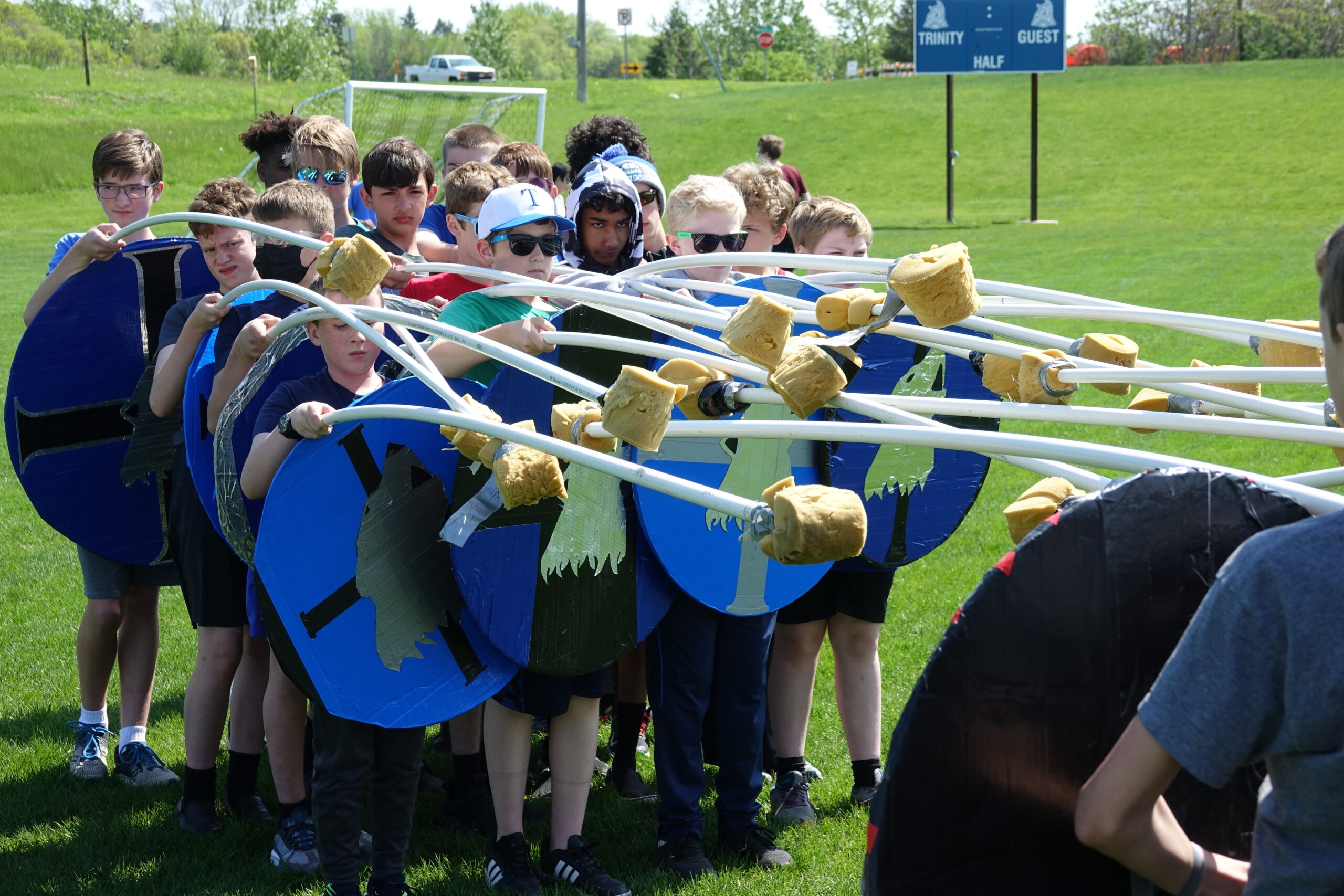“I love to come to school every morning because it’s such a fun environment. Your friends are waiting for you. The ping pong tables are waiting for you. Your classes are waiting for you. You can’t ask for much more than that.”
Current 7th grade boy
The best way to take full advantage of Trinity’s education is to come early – in junior high.
At a Glance
- Class sizes limited to 20 students ensures your child will be known and heard.
- Boys and girls are taught separately to eliminate distractions.
- A core curriculum that featuring literature & composition, history, science, mathematics, Latin, and the fine arts, preparing students for Trinity’s rigorous high school curriculum.
- De-emphasized grades mean that your child will receive substantive feedback on their work – not letter grades – freeing them to focus on wonder, learning and mastery.
- Veteran & upper-level teachers instruct junior high classes, as they understand best how to prepare students for the high school classroom.
- Centering daily morning prayer that feature reading of the Psalms, a reflection from a Trinity faculty member, and prayer.
- A daily homeroom course that intentionally teaches sixth graders typing, penmanship, study skills, and public speaking skills.
Culture
We also take the formation of our student culture seriously. Junior high can be a challenging time for young people, but at Trinity your child will be immersed in a culture where the ideals of charity, right speech, and honoring one another are consistently upheld.
Request More Information
Submit the form below and someone from Admissions will be in touch within 24 hours.
Curriculum
Sixth Grade
Biblical Geography (1 Semester) As a prelude to the study of the Old and New Testaments students explore the geography of the biblical lands. Students study the Ancient Near Eastern lands of Mesopotamia, Egypt, Palestine, Greece, Rome and Asia Minor.
Literature and Composition I (2 Semesters) Students develop their literary and compositional skills by reading, writing reflections, and studying Latin and Greek roots of the English language. See our reading list for the literature of the course.
Minnesota History (2 Semesters) focuses on the history of the state of Minnesota from prehistoric times to the present. Some highlights in the course include field trips to major Minnesota historical sites and various exploratory projects.
World Geography (2 Semesters) Starting with the United States and moving through the world’s continents, students use latitude and longitude coordinates, memory devices, and practice exercises to learn the geography of a world region and draw maps of its major features. By the end of the year, students use their accumulated knowledge to draw a map of the world entirely from memory!
Mathematics and Logic (2 Semesters) Students are guided through the transition from the concrete, arithmetic thought of elementary school years to more general algebraic thought of the middle school years. This transition starts with the study of fractions as numbers and continues with performing arithmetic operations on them and understanding their equivalent representations as decimals, percents and points on the number line. Horizontal enrichment is available for advanced students.
6th Grade Science (1 Semester) Students are introduced to science primarily through project-building, experimentation, and stories. Sections include lake, sea, and glacier ecology; the chemistry and nutrition of cooking; and simple machines.
World Mythology (1 Semester) Student read and engage with Egyptian, Greek, Norse and Native American myths, developing knowledge of the stories and their characters, considering the different ways that these peoples tried to understand the world around them through stories.
6th Grade Art (1 Semester) Students participate in units on the fundamentals of drawing and composition, the study of value, and the use of color. Each unit culminates in an original composition.
Homeroom (2 Semesters) Students have the opportunity in sixth grade to build critical academic skills in typing, penmanship, study strategies, and public performance skills. In addition to these, students have the opportunity to explore topics not otherwise covered in their classes. Homeroom also includes a weekly Music Appreciation course.
Seventh Grade
Prealgebra (2 Semesters) Students initially focus on numbers and their properties, especially integers, decimals, fractions and percentages. They are then introduced to elementary set theory and move on to geometric figures and their properties. Finally, they study linear equations. Horizontal enrichment is available for advanced students.
7th Grade Science (1 Semester) Students study a wide variety of topics including insects, astronomy, trees, rocks, mammals, plate tectonics, weather, plants, surface processes and birds. Observation and the development of a sense of wonder are foundational to the course.
7th Grade Literature and Composition (2 Semesters) Students continue to learn how to read both poetry and longer fiction accurately and with engagement. They also begin their study of formal English grammar and learn how to write a coherent paragraph. See our reading list for the literature of the course.
Ancient History (2 Semesters) Students explore early civilizations from the rise of the Sumerians around 3500 BC to the sack of Rome in 410 AD, with an emphasis upon the Greco-Roman civilizations. They are introduced to the significant questions and tensions of civilization itself, such as how to balance security and freedom and what features of a political arrangement best promote human thriving.
Old Testament (1 Semester) Students read many of the narrative accounts of the Old Testament. Emphasis is placed upon God’s establishment of a covenant with his people, the history of Israel, and the messianic hope.
Latin I (2 Semesters) Students begin their formal study of Latin by learning three of the groups (declensions) of nouns and adjectives and all verb groups (conjugations), including irregular verbs. Over the course of the year, students master a substantial vocabulary, understand elementary Latin grammar and acquire a basic skill in translating from English to Latin as well as from Latin to English.
Music I (1 Semester) Students study music theory and the history of the Baroque Era in music. They learn the rudiments of note-reading, note values and rhythm, time signatures, major scales and key signatures. By the end of the semester, students both perform individually in a recorder recital and write several elementary melodies.
Art I (1 Semester) Students begin with a unit on calligraphy, emphasizing basic pencil techniques and the use of color in illuminated word designs. They then learn to draw, with an emphasis on proper proportions and shading, and finish the semester by studying and practicing portraiture.
Eighth Grade
Algebra (2 Semesters) Students develop skills for solving equations with one and two variables, learn quadratic and linear equations and are introduced to functions and their graphic representations. The concepts and skills the students gain in this course are the foundation for all future mathematics at Trinity School. Horizontal enrichment is available for advanced students.
8th Grade Science (1 Semester) Students participate in project-based learning throughout the semester. Each student completes a major project on a topic from life, earth or space science. This project includes a written report and the construction of a three-dimensional model.
8th Grade Literature and Composition (2 Semesters) Throughout the year, students read and discuss literature, develop a mastery of English grammar and punctuation, and learn how to write a formally organized paragraph that becomes the basis for later essays. See our reading list for the literature of the course.
Medieval History (1 Semester) Students study the history of Western Europe from roughly 200 BC to the beginning of the Renaissance, learning about the emergence and spread of Christianity in the Roman Empire, the development of modern nation-states from the collapsed Roman Empire, the role of the Catholic Church and its institutions in Western Europe, the struggles between the church and secular authorities and the conflict between Islam and Christian Europe.
New Testament (1 Semester) Students review the Old Testament claims about the end of Israel’s exile and then proceed with an in-depth reading of the Gospel of Mark as the story of God acting in the person of Jesus to fulfil his promises. They then read the Acts of the Apostles and excerpts from the Epistles and the Book of Revelation.
Latin II (2 Semesters) Students master the core grammar of Latin in eighth grade, learning the indicative forms of active and passive verbs, five noun declensions, adjectives, pronouns, adverbs and subordinate clauses. Learning new vocabulary and grammar is aimed increasingly at understanding the relationships of different parts of a sentence and at fluid translation of Latin stories.
Music II (1 Semester) Students build on the foundation laid in seventh grade, continuing playing the recorder (now in ensembles), studying the history of the Classical Era in music and building upon their music theory. Students perform in ensembles at the end of the semester and each writes a two-part composition.
Art II (1 Semester) Students review the drawing techniques learned in seventh grade then learn several new drawing skills and new techniques with colored pencils, pastels and watercolors.
“Instead of trying to undo what our kids pick up at school, Trinity has helped us to reinforce our values and the importance of knowing how to think rather than just regurgitating facts. The focus on faith, right behavior, and reason has been evident from our son’s first weeks at Trinity.”
TRINITY PARENT





